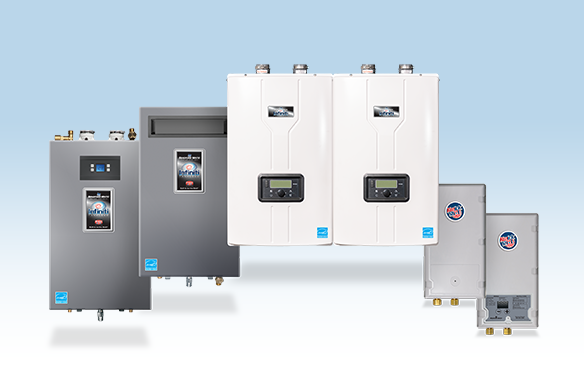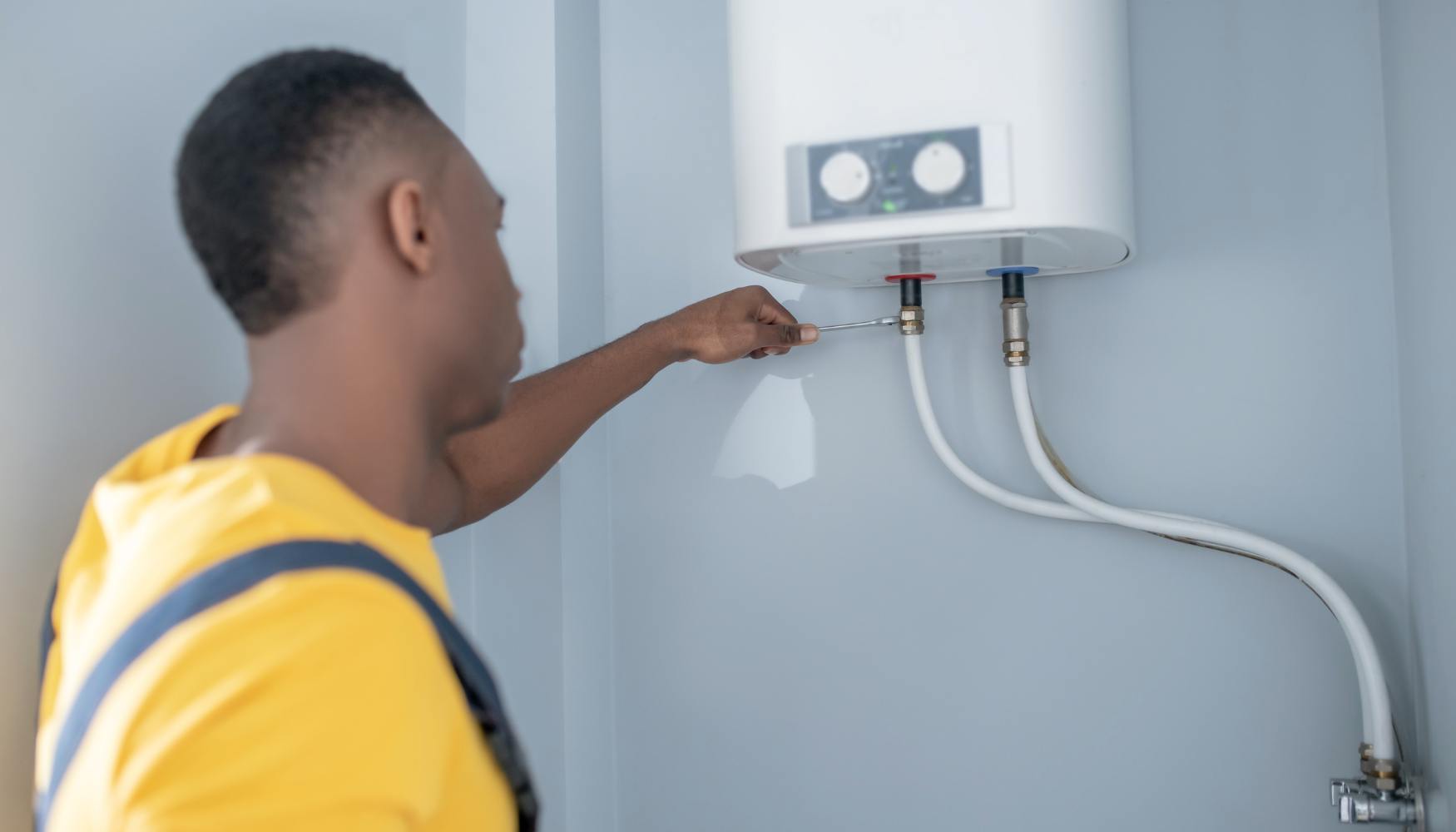A Manual To The Pros Of On-Demand Water Heaters
A Manual To The Pros Of On-Demand Water Heaters
Blog Article
We have found this great article pertaining to Pros and Cons of Tankless Water Heater listed below on the internet and thought it made perfect sense to talk about it with you on this page.

In a globe where comfort and performance reign supreme, it's not a surprise that homeowners are continuously in search of smarter means to handle their home's energy intake and comfort. One development that has gradually gained popularity is the tankless water heater. But what exactly makes these systems attract attention from the conventional tank-based models a lot of us matured with? Let's dive in and discover the benefits of tankless hot water heater, assisting you determine if it's time to make the switch in your home.
Introduction
Picture this: you enter the shower after a lengthy day, anticipating a relaxing waterfall of warm water, only to be greeted by icy beads since the last individual used it all up. Noise familiar? Traditional water heaters keep a fixed quantity of hot water, implying you go to the grace of that tank's supply. Tankless systems, on the other hand, warm water as needed. Say goodbye to running out mid-shower, no more wrestling with timetables simply to guarantee hot water is offered.
Understanding Tankless Water Heaters
What Are Tankless Hot Water Heater?
Tankless hot water heater, in some cases called on-demand or immediate hot water heater, supply hot water only as it's required. As opposed to storing gallons of pre-heated water, these devices kick right into activity the moment you switch on the tap. Water passes through a heat exchanger, warming up in real-time, suggesting you get a continuous circulation of warm water without the requirement for a large storage tank sitting idly by.
Exactly how Do They Vary from Conventional Equipments?
Conventional heating systems hold a reservoir of warm water, utilizing power to keep that container at a consistent temperature level. Tankless systems eliminate the standing supply, minimizing thrown away power and the cumbersome impact of a large cyndrical tube. Basically, you're updating from a "stockpile" mindset to a "made-to-order" technique.
Usual Types of Tankless Systems
Tankless hot water heater usually are available in 2 varieties: gas and electrical. Gas models have a tendency to provide higher circulation prices, suitable for larger houses, while electrical designs commonly serve smaller homes and are usually less complicated to mount. In addition, some systems are developed for point-of-use (offering one fixture) while others can manage the whole home's warm water requirements.
Trick Advantages of Tankless Water Heaters
1. Limitless Hot Water Supply
Ever needed to schedule showers so every person gets their reasonable share of hot water? With tankless, that ends up being a distant memory. As long as the heating system's flow capability isn't surpassed, you can take back-to-back showers without turning into a popsicle.
2. Power Efficiency and Expense Financial Savings
No more heating a giant storage tank's well worth of water and maintaining it warm all the time. Tankless heating units lower standby power losses, which can decrease energy expenses. While the initial expense could be higher, the long-lasting cost savings often justify the financial investment.
3. Space-Saving Layout
If your home is short on storage space, eliminating the bulky container maximizes important space. Tankless devices are small and can commonly be installed on wall surfaces, stashed in corners, or mounted in tight utility storage rooms without having all to oneself the entire area.
4. Longer Life expectancy
A well-kept tankless hot water heater can outlast its tank-based cousin. Typical storage tanks could last 10-15 years, while tankless models can maintain downing along for two decades or even more, making them a strong investment gradually.
5. Improved Water Top Quality
Storing water in a tank can sometimes lead to sediment accumulation or a somewhat "off" taste. With tankless systems, fresh water is warmed on the spot, decreasing the opportunities of sediment accumulation and potentially using cleaner-tasting water.
Considerations Before Switching
Though the benefits are engaging, it's wise to think about a couple of factors before totally committing.
Preliminary Investment Prices
Tankless heaters typically come with a greater in advance cost. In between the device itself and prospective installation alterations, the preliminary price could provide you sticker shock. Yet keep in mind to watch it as a long-term investment.
Setup Needs
Depending upon your home's infrastructure, you may require additional electrical ability or gas line upgrades. Ensure you understand the installation requirements and seek advice from a specialist to stay clear of surprises.
Assessing Your Home's Water Usage Patterns
If your house all at once makes use of several fixtures with high hot water need, ensure the device's flow price fulfills your needs. Understanding your use patterns assists you choose the ideal size and sort of tankless heater.
Upkeep and Treatment Tips
Tankless systems are reasonably reduced upkeep, however they aren't set-it-and-forget-it home appliances.
Regular Cleansing and Descaling
Difficult water minerals can build up in the warmth exchanger, influencing effectiveness. Normal descaling (often recommended each year) keeps the device running at peak performance.
Yearly Professional Evaluations
A yearly checkup from a specialist guarantees small issues are caught early. They'll assess the system's efficiency, search for leakages, and aid maintain ideal performance.
Guaranteeing Appropriate Air Flow
For gas versions, proper ventilation is important to securely eliminate exhaust gases. Ensure venting systems are tidy and correctly mounted to prevent any kind of potential safety risks.
Comparing Different Brands and Versions
Not all tankless water heaters are created equal.
Researching Reliable Producers
Search for reputable brand names with a background of creating high quality units. A reliable supplier usually supplies much better customer assistance and longer warranties.
Checking Out Reviews and Individual Comments
Customer reviews and comments from next-door neighbors or pals that have gone tankless can supply important understandings. In some cases, real-life experiences can be extra telling than marketing pamphlets.
Installment: DIY or Professional?
While some homeowners cherish tackling jobs themselves, tankless setup might not be the best time to break out the toolbox.
Pros and Cons of Do It Yourself Installation
A do it yourself set up might save money, however it features dangers. Inaccurate installation can lead to inadequacy or safety and security problems. If you come in handy and have experience, it might be viable-- however proceed with care.
When to Call an Expert Plumbing
For most, calling a professional ensures every little thing's done correctly. A specialist plumbing understands regional codes, sizing demands, and venting specifications, reducing the threat of accidents.
Making best use of Effectiveness
You've purchased a tankless device-- currently maximize its effectiveness.
Optimum Temperature Level Setups
Lots of people establish their systems in between 120-140 F. Changing the temperature level can enhance comfort and cost savings. Experiment to discover a sweet spot that doesn't lose energy.
Pairing with Low-Flow Fixtures
Intend to extend your device's capacities? Take into consideration setting up low-flow showerheads and faucets. They reduce water use, enabling your tankless system to deliver a constant stream of hot water without stressing.
Ecological Influence
Tankless water heaters align with greener living objectives.
Reduced Carbon Footprint
By utilizing much less energy and just home heating water as required, tankless systems can lower your home's carbon footprint, lowering your environmental impact.
Saving Natural Resources
Less power consumption and much less squandered warm water equate right into less natural resources being utilized, an ecological win-win.
That Profits A Lot Of from Tankless Heating systems?
The charm of tankless heating units is that they can suit a range of families.
Huge Family Members vs. Solitary Owners
Huge family members could enjoy the countless warm water supply, while solitary residents appreciate the energy savings from not warming a whole storage tank for simply someone's early morning shower.
House Owners with Limited Room
If your home is short on square video, losing the large container maximizes room for various other basics-- or possibly simply much more breathing space.
Eco-Conscious Consumers
Going tankless aligns with environmentally friendly worths, ensuring you're not wasting energy or sources.
Future Fads in Tankless Water Heaters
The world of home devices is ever-evolving, and tankless hot water heater are no exemption.
Smart Home Integration
Visualize adjusting your hot water heater's temperature through an app or getting maintenance informs on your phone. As clever home tech breakthroughs, we'll see even more connectivity and convenience.
Innovations in Modern technology
R&D is regularly enhancing warmth exchangers, making units more reliable and durable. Future designs could be even quieter, extra compact, and better matched for differing climates.
Final thought
Selecting a tankless hot water heater is greater than just upgrading your home's hot water system; it's purchasing long-lasting comfort, energy efficiency, and a greener way of life. By considering your home's water usage, bearing in mind installment requirements, and dedicating to regular maintenance, you can delight in a consistent stream of warm water without the luggage of a large container. As innovation evolves, you can anticipate even smarter, more effective tankless solutions that not only make your life easier but also benefit the earth.
Six Benefits of a Tankless Hot Water Heater
Continuous hot water. Large families know what a pain it is to hop into the shower and get blasted with cold water. With a tankless hot water heater, this doesn't happen as long as you install the right size tank. Even if you don t have a large family, a tankless hot water heater allows you to use multiple appliances at once without running out of hot water. Reduced energy bill. Because tankless heaters are essentially "off" when the water tap is not on, they use less energy overall. In fact, an ENERGY STAR-qualified tankless hot water heater can use 25-40% less energy than a conventional water heater, and save the average family $100 or more annually. Longer life. Get more bang for your buck with a greater lifespan. Specifically, conventional hot water heaters last about 10-13 years compared with up to 20 years for a tankless hot water heater. Less space. Did you know that tankless hot water heaters can be hung on a wall almost anywhere in your home? Plus, at 28" tall by 20" wide and 10" deep, a tankless hot water heater takes up a lot less space than a conventional hot water heater, which is 60" tall and 24" wide. Good for the environment. In addition to reducing the amount of energy used, most propane-fired tankless water heaters are made of recycled materials. Many conventional tanks, on the other hand, go directly to the dump once they've served their purpose. High safety ratings. Conventional water heaters are "always on" and thus pose safety risks more often than do tankless heaters, which only operate when warm water is needed. https://www.rotorooter.com/blog/water-heaters/six-benefits-of-a-tankless-hot-water-heater/

Hopefully you enjoyed reading our piece about Six Benefits of a Tankless Hot Water Heater. Thanks a ton for taking the time to browse our content. Those who enjoyed reading our article plz be sure to pass it around. I thank you for reading our article about Six Benefits of a Tankless Hot Water Heater.
Make An Appointment Report this page